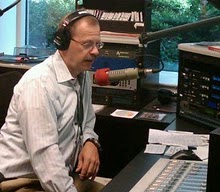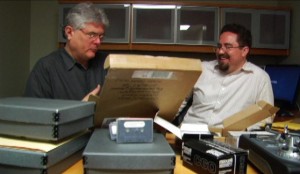When I first interviewed Robert Darden of the Black Gospel Music Restoration Project for A Life’s Work in Chicago (August 2009), one collector’s name came up again and again. Bob Marovich.
Bob Marovich is a gospel music historian, radio announcer, and journalist. Since 2001, he has hosted “Gospel Memories,” a weekly radio program featuring classic gospel on WLUW Chicago. He is currently at work on a book-length history of gospel music in Chicago, to be published in 2013, and is the editor of The Black Gospel Blog.
The idea to interview Marovich came to me as I was editing a Darden section. In it Darden mentions the moment in his life when his passion for gospel music took hold (this will be a future blog post read the post and view the clip!), and I wondered if Marovich had a similar moment and trajectory. I realized after conducting the interview that whether they discovered their passions in a similar way hardly matters, really; what’s interesting is the personal story of an individual’s discovery.
Tell me when and how you first became interested in this music?
In January 1984, while in college, I literally stumbled upon a church radio broadcast of Dr. Charles G. Hayes and the Cosmopolitan Church of Prayer. It’s a holiness church on Chicago’s south side. They did a rendition of “Every Time I Feel the Spirit” that remains my all-time favorite. I recorded that radio broadcast on cassette and played it for many years afterwards.
Since then, I have gotten to know Father Hayes and his singers and musicians personally.
In the early 1990s, my interest in gospel was further enhanced when my late wife Pat was a choir director at Providence St. Mel School on Chicago’s west side. Her choir would always end their programs with a gospel song popular at the time, whether it be John P. Kee, O’Landa Draper, Ricky Dillard, Kirk Franklin or Douglas Miller. Four of Pat’s female students formed a semi-professional gospel quartet that sang old-school a cappella. They even appeared on a television show hosted by gospel star Vickie Winans!
When did you start seriously collecting?
I started collecting records at age five (“Hang ‘em High” by Booker T and the MGs was my first disc), but it wasn’t until the mid-90s that I began collecting gospel records. I used to go to flea markets and Chicago’s Maxwell Street Market early Sundays to find gospel 45s and 78s for fifty cents or a dollar each. Man, those were the days!
Do you have any idea how many LPs, 45s, CDs you have?
I have about 3,800 gospel 78s and 45s; 1,300 LPs; and CDs…thousands! As a reviewer for The Black Gospel Blog, a website I founded in 2004, I am serviced with CDs from current and emerging gospel artists every week. So the collection grows constantly.
As far as other music in my collection, just triple the above amount! I now rent a storage unit to house the rest of the collection, which runs from jazz to R&B to classical to 50s/60s/70s pop to folk, vocal group harmony, rock…from early Irish 78s to French female singers on 45. Lord Jesus, you name it, it’s in there! I now understand what my MBA professors meant by the problem of inventory and storage costs.
Is there something out there that you know exists, or existed, and you’d like to have but it hasn’t turned up?
As a gospel historian working on a history of Chicago gospel, I am always on the lookout for homemade or studio-made acetates and radio transcriptions of early gospel music and church broadcasts. It’s the only way for us today to hear pioneering groups, artists, quartets and churches that never recorded commercially.
For example, Elder Lucy Smith’s All Nations Pentecostal Church radio broadcasts were legendary in 1930s and 1940s Chicago. Everybody who was anybody visited Elder Smith’s church to sing back in the day. Her church made only one disc, for Vocalion in the late 1920s: a very formal performance by the “Lucy Smith Jubilee Singers.” Yet we know that Elder Smith made and distributed transcription discs of her high-spirited church services regularly to at least four radio stations nationally. Romance Watson of the Roberta Martin Singers told me he remembered making them when he was a member of All Nations. Should any turn up, they would provide a wonderful aural example of what early Chicago Pentecostal music sounded like.
Second, Mahalia Jackson produced homemade recordings for sale at her church programs in the mid-30s. This was prior to her first commercial studio session for Decca in May 1937 and more than a decade before her breakout single, “Move On Up a Little Higher.” Those homemade recordings, if ever found, would give us a very rare chance to hear a young, holy dancing Mahalia sing the way church folk remembered.
Really, any early homemade recordings of Chicago gospel choirs prior to 1946 – the earlier the better – would allow us to hear the style of these pioneering gospel choruses. Discs (and even moving pictures) were made of Professor Dorsey’s 1930s choirs, but none have turned up yet.
Last year, I purchased an old 16-inch transcription player in an on-line auction so I could play transcription discs, if and when I find them. So far I have a handful of these discs, mostly Wings Over Jordan radio broadcasts and gospel choirs who were guests on the WOJ programs during the mid-40s, for the Armed Forces Radio Network. Fascinating glimpses into the past!
How did your association with Robert Darden and BGMRP come about?
I knew of Bob Darden through his book, People Get Ready, before I spoke with him. I can’t remember who reached out to who first, but we began communicating via e-mail, and when he announced the generous gift for the Black Gospel Music Restoration Project, I was only too happy to promote it on The Black Gospel Blog and offer to help however needed. Believe it or not, Bob and I have yet to meet in person, but we have been in close contact via phone and email for quite some time now.
Did you have any reservations about loaning your vinyl?
Normally I don’t loan my records or books to anyone, because when I do, I almost never get them back! But from the get-go, Bob Darden and his engineer, Tony Tadey, put me at ease with the efficiency of their mailing process and handling of the records. They are very careful, extremely professional, and you get your records back! They are collectors themselves, so they know and appreciate what a leap of faith it is to loan portions of one’s music collection. They treat your collection as if it were their own.
That’s funny. I thought for sure you two had met! Well, moving on, why do you think the BGMRP is a worthwhile endeavor?
To me it is important that gospel music is being digitized and made available for generations to come. I have heard way too many stories from gospel artists about how floods, fires and storms destroyed collections of their personal photos and records. One church even threw away dumpsters’ full of wire recordings of church services and radio transcriptions. Gospel records, which used to be fairly inexpensive to collect, are now fetching high prices, due to their rarity. Bob Darden and his team are making sure that what still remains is preserved for everyone in the safest way possible. They are treating gospel music with the dignity and respect any indigenous art form deserves.
What is your life’s work?
My life’s work is not dissimilar to Bob’s. In my own way, I am preserving music through writing, broadcasting and developing a personal archive. In 2007, I walked away from a 22-year career in fundraising and management for nonprofits to devote more time to this endeavor. While I remain a grantwriter part-time to make ends meet, I dedicate much of my time to gospel music. Right now I am working on a full-length history of gospel music in Chicago and believe I have at least three more good books in me.
I hope someday to be to gospel music what writer and critic Nat Hentoff was to jazz.
Bob Marovich’s radio shows are archived on his blog. Make sure to give them a listen.
Also worthy of your ears is Context and Commentary, Black Gospel Music, a conversation between Darden, Marovich, and Dr. Gardner Campbell, Director of the Academy of Teaching and Learning at Baylor University. It’s a history lesson like no other.



Robert Darden
Bob Marovich is too modest by half! He is one of nature’s true gentlemen and an absolutely amazing scholar/fan of gospel music. I can not emphasize enough how important his collection has been to the Black Gospel Music Restoration Project — and gospel music in general. I am honored to be able to call him friend.
David Licata
I just assumed you two had met! The time we were in Chicago, I thought maybe there was a meeting of the minds then. And of course, “Context and Commentary, Black Gospel Music.” I know you don’t have to be in the same room, but that’s the power of the medium–it impressed upon me that you were.
It was a pleasure to interview him and I delighted in his answers. I hope next time I’m in Chicago we get to spend some face-to-face time together. Maybe you’ll be there, too? Who knows, it could happen!
Libra
I cosign Robert Darden’s comments. Bob Marovich’s passion for his work is unparalleled.
David Licata
Hi Libra,
Thanks for stopping by, and thanks for the comment. Hope to see you around these parts again.
Best,
David
Libra
Sure thing, David!